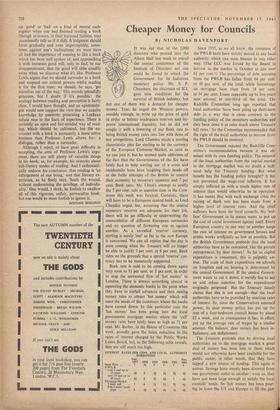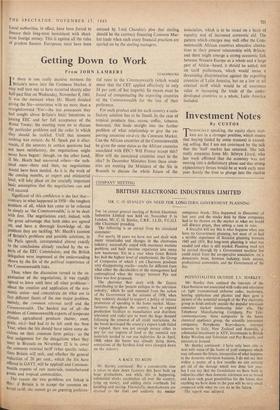LUXEMBOURG
For each product and for each country a satis- factory solution has to be found. In the case of tropical products (tea, cocoa, coffee, tobacco, bananas), this leads straight into the further problem of what relationship to give the ex- porting countries vis-a-vis the Common Market. Can the African countries of the Commonwealth be given the same status as the African countries associated with EEC? Will France accept this? How will the associated countries react to the idea? In December Ministers from these coun- tries are meeting the Ministers of the Six in Brussels to discuss the whole future of the
COMPANY MEETING
BRITISH ELECTRONIC INDUSTRIES LIMITED
MR. C. 0. STANLEY ON NEED FOR LONG-TERM GOVERNMENT PLANNING
THE 1st annual general meeting of British Electronic Industries Limited was held on November 9 in London, Mr. C. 0. Stanley, C.B.E., LL.D., F.C.G.I. (the Chairman) presiding.
The following is an extract from his circulated statement :
For nearly 30 years we have met and dealt with many vicissitudes and changes in the, electronics industry, successfully coped with enormous wartime problems and built wartime experience into many new businesses. Yet in a year when Great Britain has htid the highest level of employment, the Group of Companies of which I am Chairman produces very disappointing results--results far different from what either the shareholders or the management had contemplated when the merger between Pye and Ekco was first proposed.
The chairman then dealt with the factors contributing to the 'present collapse in the television industry,' which he said stemmed from the action of the Government in the autumn of 1958, when they suddenly decided to support a policy of intense promotion of spending in the home market. Manu- facturers throughout the country had to expand production facilities to manufacture and distribute television and radio sets to meet the huge demand following the removal of all credit restrictions. As the boom developed the country's export trade failed to expand, there was not enough money either to pay for our imports of food or the essential raw materials needed to run our industries. So in April, 1960, when the boom was already dying down, restrictions of the harshest kind were clamped down on the industry.
• A RACE TO RUIN
Mr. Stanley continued : But a considerable time is taken to slow down factories that have built up large productions, and while this is happening, substantial stocks accdmulate all over the country, tying up money, and adding extra overheads for handling and storing. Financially, manufacturers are strained to the limit and suddenly the weaker association, which is to be recast on a basis of equality and of increased economic aid. The pattern which emerges may well offer the Com- monwealth African countries attractive alterna- tives to their present relationship with Britain; and there might emerge a strong economic link between Western Europe as a whole and a large part of Africa—based, it should be added, not on tariff preferences, 'which would mean a devastating discrimination against the exporting countries of Latin America, but on a low or nil external tariff which would be of enormous value in increasing the trade of the under- developed countries as a whole, Latin America included.
Investment Notes
By CUSTOS
TECHNICALLY speaking, the equity share mar- kets are in a stronger position, which means that buying (aided by some trustees) is exceed- ing selling. But I am not convinced by the talk that the 'bull' market has returned. The talk really emanates from Mr. Selwyn Lloyd, who last week affirmed that the economy was not moving into a deflationary phase and that strong expansionary forces would-be at work early next year. Surely the time to plunge into the market
companies break. This happened in December of last year and the stocks held by these companies had to be thrown on the market at what we would call distress prices, thus setting a race to ruin.
A Socialist will say this is what happens when you have no Government planning, but most of us had a terrible experience of Socialist planning between 1945 and 1951. But long-term planning is what was needed and what is still needed. Planning need not be carried through by a Government machine but could result from the co-operative association, on a democratic basis, between industry, trade unions, professional economists, and the Government of the day.
POTENTIALITIES OUTSIDE T.V. MARKET Mr. Stanley then outlined the interests of the Ekco business not associated with radio and television i.e. light transistorised airborne radar, nucleonics, heating appliances and plastics and then gave a picture of the potential strength of the Pye electronic group in fields entirely outside the popular television consumer market mentioning inter alia, The Telephone Manufacturing Company, Pye Tele- communications, three companies in the home electrical appliance group, the scientific instrument companies, Pamphonic Reproducers, overseas interests in Italy, New Zealand and Australia, p substantial investment in ATV, investments in British Relay Wireless and Television and Pyc Records, and interests in Ireland.
Mr. Stanley continued: I have only been able to deal with some of the facets of yotir company which may influence the future, irrespective of what happens in the domestic television business. I do not say that within a matter of a few months we can entirely get rid of the damage which was done last year, but I can say that the foundations we have built in industries other than domestic television arc so broad and have such great possibilities for the future that anything we have done in the past will be very small compared with what we can do in the future.
The report was adopted.







































 Previous page
Previous page